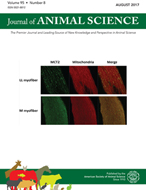-
Views
-
Cite
Cite
B. R. Min, W. E. Pinchak, R. C. Anderson, J. D. Fulford, R. Puchala, Effects of condensed tannins supplementation level on weight gain and in vitro and in vivo bloat precursors in steers grazing winter wheat, Journal of Animal Science, Volume 84, Issue 9, September 2006, Pages 2546–2554, https://doi.org/10.2527/jas.2005-590
Close - Share Icon Share
ABSTRACT
Research was conducted to determine the effects of level of supplementation with quebracho condensed tannins (CT) on in vitro ruminal fluid gas production, in vivo ruminal fluid protein fractions, bloat dynamics, and ADG of steers grazing winter wheat. Two experiments were conducted to 1) enumerate the effect of ruminal fluid from steers fed quebracho CT (0, 1, and 2% CT/kg of DMI) on in vitro gas and methane production from minced fresh wheat forage; and 2) quantify the influence of CT supplementation on ruminal protein characteristics, biofilm complexes, bloat potential, and ADG of steers grazing wheat pasture. Eighteen ruminally cannulated steers (386 ± 36 kg of BW) were randomly allocated to 1 of 3 treatments that included a control (water infusion) and 2 CT treatment levels (1 or 2% CT/kg of DMI). Treatments were administered daily (63 d) through the rumen cannula as pre-mixes with warm water (approximately 30 ° C). Rumen contents were collected 2 h postinfusion (at 1030 to 1130) on d 0, 20, 40, 50, and 60. Bloat was visually scored daily for 5 d each wk. In Exp. 1, supplementation of CT decreased the rate of in vitro gas production in a dose-dependent response. In Exp. 2, ADG increased (P < 0.04) at both levels of CT supplementation. Mean bloat score across stage of growth and replicates decreased linearly with increasing CT supplementation; bloat scores were greater (P < 0.001) for the vegetative than for the reproductive stage of plant growth. Biofilm production and rumen fluid protein fractions varied among CT treatments and stage of growth. Addition of CT reduced the severity of bloat, principally through reducing microbial activities, biofilm production, and ruminal gas production. Quebracho CT is potentially a value-added supplement that can decrease the impacts of frothy bloat and increase BW gains in stocker cattle-wheat systems.





